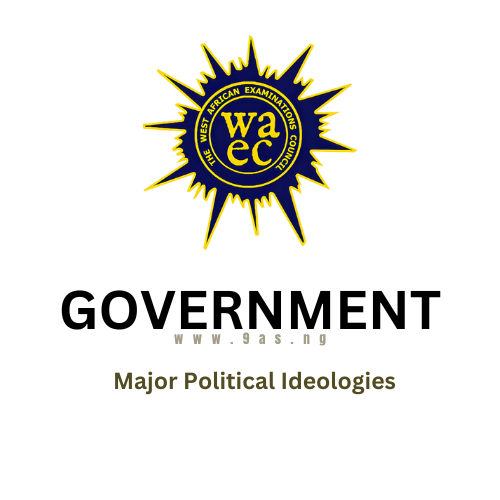THEORY
1. What are the characteristics of feudalism?
2. What is Capitalism?
3. Outline any five features of capitalism.
4. (a) Explain the concept proletariat
(b) Highlight four features of socialism.
5. (a) Define Communism
(b) Outline four features of Communism.
6. (a) Define feudalism.
(b) State any five demerits of feudalism.
7. Define Capitalism.
8. State two advantages and two disadvantages of capitalism
9. (a) What is fascism?
(b) Highlight any four features of fascism.
10. (a) What is communalism.
(b) State four differences between feudalism and communalism.
OBJECTIVES
1. Fascism emphasizes
A. equality.
B. individualism.
C. nationalism.
D. totalitarianism.
2. Which of the following is not relevant to communism?
A. Democracy.
B. Violent revolution.
C. Friedrich Engels.
D. Private Enterprise.
3. Which of the following is the lowest in the hierarchy of feudal system?
A. Knights.
B. Serfs.
C. Nobles.
D. Lords.
4. Who is regarded as the father of Communism?
A. Karl Marx.
B. V.I Lenin.
C. Benito Mussolini.
D. A.V.Dicey.
5. Another name for Totalitarianism is
A. Socialism.
B. Capitalism.
C. Communism.
D. Authoritarianism.
6. Which of the following concepts is out of place?
A. Fascism.
B. Welfarism.
C. Totalitarianism.
D. Authoritarianism.
7. Which of the following systems of government is authoritarian in nature?
A. Capitalist system.
B. Fascism.
C. Republicanism.
D. Constitutional monarchy.
8. According to Karl Max, socialism developed as a consequence of the evils of
A. monarchy.
B. communalism.
C. feudalism.
D. capitalism.
9. As a political ideology, communism seeks to
A. accumulate capital in the hands of a few.
B. accommodate division of citizens into classes.
C. eliminate all forms of socio-economic inequalities.
D. create economic opportunities for profit-making.
10. Which of the following is the lowest class of people in the hierarchy of feudal system?
A. Nobles.
B. Serfs.
C. Lords.
D. Manor.
11. Totalitarianism means a government headed by
A. a dictator.
B. wealthy people.
C. educated elite.
D. the masses.
12. Mussolini’s fascism and Hitler’s Nazism are good examples of
A. anarchy.
B. Feudalism.
C. totalitarianism.
D. oligarchy.
13. An undesirable feature of capitalism is
A. exploitation.
B. market economy.
C. profit motive.
D. free competition.
14. The guiding principle of communism is ‘from each according to his/her
A. ability and to each according to his/her need’.
B. qualification and to each according to his/her need’.
C. race and to each according to his/her ability’.
D. age and to each according to his/her status’.
15. A classless society is the ultimate goal of
A. socialism.
B. totalitarianism.
C. capitalism.
D. feudalism.
16. Fascism as a system of government originated in
A. Italy.
B. Germany.
C. France.
D. Britain.
17. Authoritarianism is least inherent in
A. feudalism.
B. fascism.
C. democracy.
D. monarchy.
17. Which of the following countries practiced totalitarianism
A. Germany, Russia and Japan
B. Italy, Russia and Germany.
C. Italy, Germany and Japan.
D. Russia, Italy and England.
18. Socialism developed as a protest against the evils of
A. monarchy.
B. oligarchy.
C. feudalism.
D. capitalism.
19. According to Karl Marx, socialism is the prelude to
A. communism.
B. capitalism.
C. feudalism.
D. fascism.
20. Who among the following is associated with fascism?
A. Karl Marx.
B. Joseph Stalin.
C. John Locke.
D. Benito Mussolini.
21. A fascist regime is both
A. representative and accountable.
B. responsive and responsible.
C. fair and legitimate.
D. authoritarian and totalitarian.
22. The two major factors that contributed to the development of capitalism were
A. emergence of the Protest Reformation and paper money.
B. the emergence of Adolf Hitler and the First World War.
C. the theory of individual Rights and the Industrial Revolution in Britain.
D. the First World War and the Atlantic Charter of 1941.
23. Which of the following is a feature of capitalism?
A. Removal of social inequalities.
B. Equitable re-distribution of property.
C. Maximization of profit.
D. Protection of workers.
24. In a capitalist state, the society is polarized into the
A. Christians and the Muslims.
B. government and the workers.
C. bourgeoisie and the proletariat.
D. diligent people and the lazy people.
25. A system of government in which political leadership is based on land ownership is
A. communism.
B. feudalism.
C. capitalism.
D. socialism.
26. The highest stage of socialism is
A. fascism.
B. communalism.
C. communism.
D. feudalism.
27. Communism was popularized by
A. Karl Marx and Friedrich Engels.
B. Max Weber and Aristotle.
C. Plato and Socrates.
D. Harold Laski and Jean Bodin
28. A classless society is obtainable in
A. communism.
B. capitalism.
C. feudalism.
D. plutocracy.
29. Capitalism is an economic system in which
A. the economy of the state is centrally planned and controlled.
B. private persons are permitted to undertake enterprises.
C. accumulation of private property is forbidden.
D. the means of production are owned and controlled by the state.
30. The Fascist State in Europe was
A. Italy.
B. Germany.
C. Japan.
D. Britain.
31. Communalism ensures that everybody within the society is provided
A. a means for transportation.
B. with a chieftaincy title.
C. with a formal education.
D. a land to farm.
32. In which system of government does the state require the control of everything and allows no
opposition?
A. Feudalism.
B. Capitalism.
C. Totalitarianism.
D. Communism.
33. The lowest class of people in the hierarchy of Feudal system is made up of the
A. Lords.
B. Nobles.
C. Serfs.
D. Knights.
34. In a feudal system, the hierarchy of citizens is the king,
A. nobles and lords.
B. queen and lords.
C. knights and nobles.
D. lords and serfs.
35. A totalitarian government is a government
A. that aspires to control every aspect of a citizens’ life.
B. for the masses.
C. of the people by the people and for the people.
D. that aspires to control only the economic aspect of a citizens’ life
36. Fascist movement has its origin in
A. Germany.
B. Italy.
C. Spain.
D. The defunct Soviet Union.
37. Which of the following countries in Africa practiced socialism?
A. Nigeria.
B. Togo.
C. Tanzania.
D. Kenya.
38. A system in which powerful and rich nobles own the lands which are hired out to the poor people to farm is called
A. feudalism.
B. capitalism.
C. socialism.
D. communism.
39. The recognition of individual rights and the industrial revolution contributed to the development of
A. socialism.
B. fascism.
C. capitalism.
D. totalitarianism.
40. The political arrangement which emphasizes community feeling and togetherness is called
A. socialism.
B. communalism.
C. constitutionalism.
D. communism.
41. Fascism was a type of dictatorial government established in
A. Germany.
B. Russia.
C. Israel.
D. Italy.
42. The theory of Socialism was popularized by
A. A.V. Dicey.
B. Karl Marx.
C. Baron de Montesquieu.
D. Aristotle.
43. Nazism is a political ideology which emphasized
A. supremacy of a race.
B. collective racial consciousness.
C. communal racial consciousness.
D. equality of all races
44. Traditional system of government in pre-colonial Nigeria was based on
A. socialism.
B. communism.
C. communalism.
D. capitalism.
45. In a fascist regime, the Head of State is
A. the royal father.
B. the prime minister.
C. the elected monarch.
D. supreme and above the law.
46. The type of government in which citizen’s rights and duties were based on a system of the land tenure was known as
A. feudalism.
B. oligarchy.
C. democracy.
D. republicanism.
47. Which of the following best describes totalitarianism?
A. Extreme decentralization.
B. Excessive centralization of power.
C. Devolution of power.
D. Delegation of power.
48. The Industrial Revolution in Europe resulted in
A. socialism.
B. communalism.
C. aristocracy.
D. capitalism.
49. A system in which people contribute for the welfare of their community can be described as
A. Communalism.
B. Socialism.
C. Communism.
D. Capitalism.
50. Which of the following best describes feudalism?
A. A few people monopolize the ownership of land.
B. Mass ownership of property is prevalent.
C. State ownership of capital is prevalent.
D. Workers administer the society.
51. Feudalism, is a system of government where
A. a few people-monopolize the ownership of land. B. factors of production are controlled by the capitalists. C. communal ownership of property is prevalent. D. state ownership of capital is prevalent.
52. One major characteristics of capitalism is that it results in
A. unjust and inequitable distribution of societal resources. B. full employment for the youths. C. organization of production to meet the needs of the poor. D. job security for casual worker.
53. The communist ideology was propounded by
A. Charles De Gaulle. B. Karl Marx, C. John Locke. D. Williams De Bois.
54. The highest stage of socialism is
A. racism. B. fascism. C. communism. D. nazism.
55. Feudalism is a practice in which
A. the citizens have no political and social rights. B. hereditary landlords ruled peasants. C. political leadership is based on force. D. the social structure is stratified.
56. Nazism was practiced in
A. Britain under Churchill. B. The United States under Woodrow Wilson. C. Germany under Adolf Hitler. D. Spain under General Franco.
57. Fascism can best be defined as the
A. government of a state controlled by a multi-party. B. system of government controlled by the armed forces. C. existence of a single party dictatorship with a life president. D. existence of an elected president for a fixed term.
58. Totalitarianism implies the control of government by
A. coalition parties. B. parties in succession. C. a few elite. D. a dictator.
59. Which of the following countries practiced totalitarian system of government before the Second World War?
A. Britain and France. B. Germany and Italy. C. The United States and Canada. D. Turkey and India.
60. The subordinate class of people in the social hierarchy of a feudal system is the
A. lords. B. vassals. C. nobles. D. armed forces.
61. Which of the following is a unique feature of a feudalism?
A. One-party rule. B. Multi-party system. C. Military rule. D. Lord-Serf relationship.
62. Which of the following is not a feature of capitalism?
A. Free enterprise. B. Private ownership of capital. C. Minimal government intervention. D. Dictatorship of the proletariat.
63. The traditional system of government in pre-colonial Nigeria was based largely on
A. Socialism. B. fascism. C. Communalism. D. capitalism.
64. Which of the following political concepts promotes sharing and cooperation in a society?
A. Aristocracy. B. Capitalism. C. Communalism. D. Oligarchy.
65. Which of the following is true about a capitalist state?
A. Private individuals control the economy. B. The workers are not exploited. C. Government controls the means of production. D. There is no class struggle.
66. The highest stage of socialism is
A. oligarchy. B. capitalism. C. totalitarianism. D. communism.
67. A communist system recognizes
A. class division. B. the need of individual. C. human capital. D. division of labour.
68. Which of the following is the lowest in the hierarchy of a feudal system?
A. Lords. B. Serfs. C. Knights D. Nobles.
69. As a political ideology, capitalism seeks to
A. encourage collective ownership of property. B. stimulate individual enterprise. C. eliminate social and economic inequalities. D. make the rich, richer and the poor, poorer.
70. A common feature of feudalism is
A. hierarchical land ownership between the lords and the serfs. B. private ownership of the means of production and distribution. C. separation of powers. D. fusion of powers.
71. Which of the following political systems discourages socialism?
A. fascism. B. Feudalism. C. Communalism. D. Welfarism.
72. The manor is a unique feature of
A. feudalism. B. monarchy. C. totalitarianism. D. communism.
73. A fascist regime is both
A. fair and legitimate. B. responsive and responsible. C. authoritarian and totalitarian. D. democratic and constitutional.
74. A system of government in which the leader exercises absolute power and allows no opposition is called
A. totalitarianism. B. Capitalism. C. communism. D. socialism.
75. Communism as propounded by Karl Marx was later interpreted by
A. Locke. B. Dicey. C. Bentham. D. Lennin.
76.A political system in which government controls every aspect of a citizen’s life is
A. feudalism. B. monarchy. C. democracy. D. totalitarianism.
77. Communist governments aim at distributing goods and services according to
A. gender and class. B. loyalty to the party. C. need and ability. D. work and residence.
78. Which political system allows only one ideology for the state?
A. Socialism B. Aristocracy C. Communalism D. Capitalism.
79. A one party system imposed by law with all other parties proscribed is
A. a socialist party system B. a de jure one party system C. a communist political system D. an elitist party system.
80. In which political system does the government control every aspects of a citizen’s life?
A. Communism B. Dictatorship C. Totalitarianism D. Aristocracy,
81. Which system of government allows for and guarantees maximum competition?
A. Social democracy B. Capitalism C. Communalism D. Feudalism.
82. A social, political and economic arrangement in which landed property and other natural resources are collectively owned is referred to as
A. Communalism B. Feudalism C. Federalism D. Liberalism,



